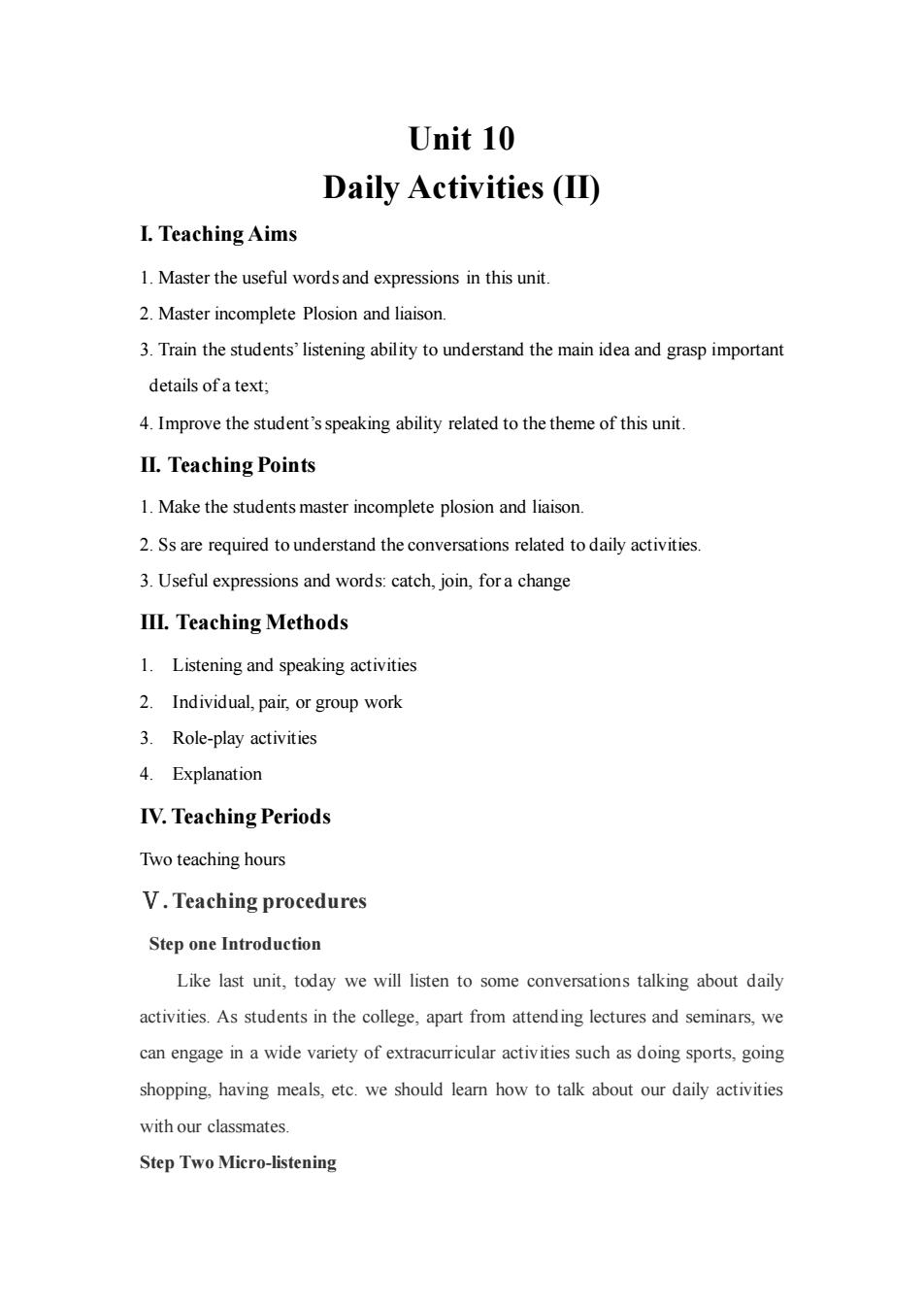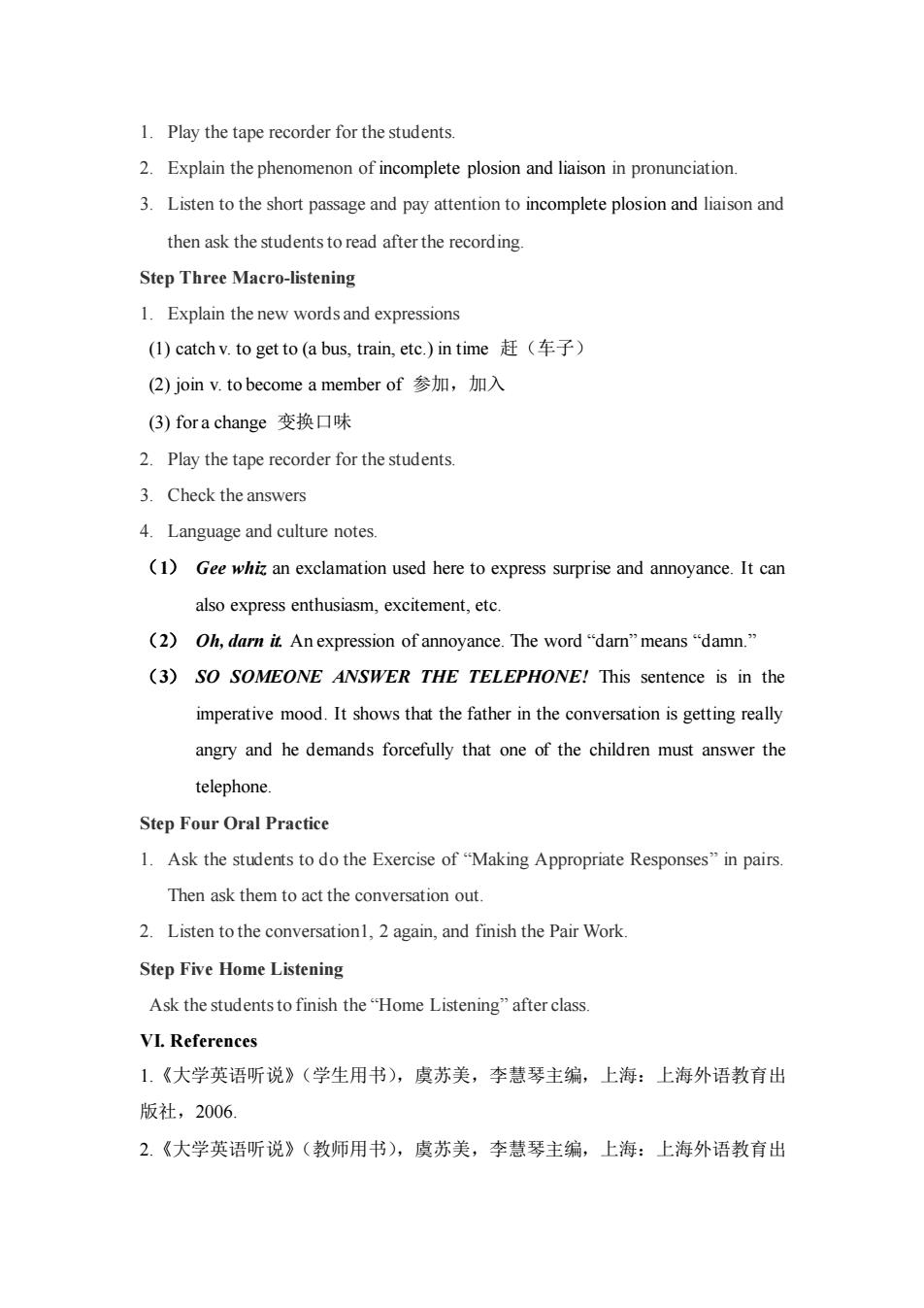
Unit 10 Daily Activities (II) I.Teaching Aims 1.Master the useful words and expressions in this unit. 2.Master incomplete Plosion and liaison. 3.Train the students'listening ability to understand the main idea and grasp important details ofa text: 4.Improve the student's speaking ability related to the theme of this unit. Ⅱ.Teaching Points 1.Make the students master incomplete plosion and liaison. 2.Ss are required to understand the conversations related to daily activities. 3.Useful expressions and words:catch,join,for a change III.Teaching Methods 1.Listening and speaking activities 2.Individual,pair,or group work 3.Role-play activities 4.Explanation IV.Teaching Periods Two teaching hours V.Teaching procedures Step one Introduction Like last unit.today we will listen to some conversations talking about daily activities.As students in the college,apart from attending lectures and seminars,we can engage in a wide variety of extracurricular activities such as doing sports,going shopping.having meals,etc.we should leam how to talk about our daily activities with our classmates Step Two Micro-listening
Unit 10 Daily Activities (II) I. Teaching Aims 1. Master the useful words and expressions in this unit. 2. Master incomplete Plosion and liaison. 3. Train the students’ listening ability to understand the main idea and grasp important details of a text; 4. Improve the student’s speaking ability related to the theme of this unit. II. Teaching Points 1. Make the students master incomplete plosion and liaison. 2. Ss are required to understand the conversations related to daily activities. 3. Useful expressions and words: catch, join, for a change III. Teaching Methods 1. Listening and speaking activities 2. Individual, pair, or group work 3. Role-play activities 4. Explanation IV. Teaching Periods Two teaching hours Ⅴ. Teaching procedures Step one Introduction Like last unit, today we will listen to some conversations talking about daily activities. As students in the college, apart from attending lectures and seminars, we can engage in a wide variety of extracurricular activities such as doing sports, going shopping, having meals, etc. we should learn how to talk about our daily activities with our classmates. Step Two Micro-listening

1.Play the tape recorder for the students. 2.Explain the phenomenon of incomplete plosion and liaison in pronunciation. 3.Listen to the short passage and pay attention to incomplete plosion and liaison and then ask the students to read after the record ing. Step Three Macro-listening 1.Explain the new words and expressions (I)catchv.to getto(abus,train,.etc.)in time赶(车子) (2)join v.to become a member of参加,加入 (3)fora change变换口味 2.Play the tape recorder for the students. 3.Check the answers 4.Language and culture notes. (1 Geewhan exclamation used here to express surprise and annoyance.It can also express enthusiasm,excitement,etc. (2)Oh,darni Anexpression of annoyance..The word“"dam”means“damn. (3)SO SOMEONE ANSWER THE TELEPHONE!This sentence is in the imperative mood.It shows that the father in the conversation is getting really angry and he demands forcefully that one of the children must answer the telephone. Step Four Oral Practice 1.Ask the students to do the Exercise of"Making Appropriate Responses"in pairs Then ask them to act the conversation out. 2.Listen to the conversationl,2 again,and finish the Pair Work. Step Five Home Listening Ask the studentsto finish the"Home Listening"after class VL.References 1.《大学英语听说》(学生用书),虞苏美,李慧琴主编,上海:上海外语教有出 版社,2006. 2.《大学英语听说》(教师用书),虞苏美,李慧琴主编,上海:上海外语教育出
1. Play the tape recorder for the students. 2. Explain the phenomenon of incomplete plosion and liaison in pronunciation. 3. Listen to the short passage and pay attention to incomplete plosion and liaison and then ask the students to read after the recording. Step Three Macro-listening 1. Explain the new words and expressions (1) catch v. to get to (a bus, train, etc.) in time 赶(车子) (2) join v. to become a member of 参加,加入 (3) for a change 变换口味 2. Play the tape recorder for the students. 3. Check the answers 4. Language and culture notes. (1) Gee whiz an exclamation used here to express surprise and annoyance. It can also express enthusiasm, excitement, etc. (2) Oh, darn it. An expression of annoyance. The word “darn” means “damn.” (3) SO SOMEONE ANSWER THE TELEPHONE! This sentence is in the imperative mood. It shows that the father in the conversation is getting really angry and he demands forcefully that one of the children must answer the telephone. Step Four Oral Practice 1. Ask the students to do the Exercise of “Making Appropriate Responses” in pairs. Then ask them to act the conversation out. 2. Listen to the conversation1, 2 again, and finish the Pair Work. Step Five Home Listening Ask the students to finish the “Home Listening” after class. VI. References 1.《大学英语听说》(学生用书),虞苏美,李慧琴主编,上海:上海外语教育出 版社,2006. 2.《大学英语听说》(教师用书),虞苏美,李慧琴主编,上海:上海外语教育出

版社,2006. 3.An Advanced English Grammar.薄冰主编.北京:高等教育出版社,1996, 4.牛津高阶英汉双解词典(第六版),牛津大学出版社,2004
版社,2006. 3. An Advanced English Grammar. 薄冰 主编. 北京:高等教育出版社,1996. 4. 牛津高阶英汉双解词典(第六版). 牛津大学出版社,2004